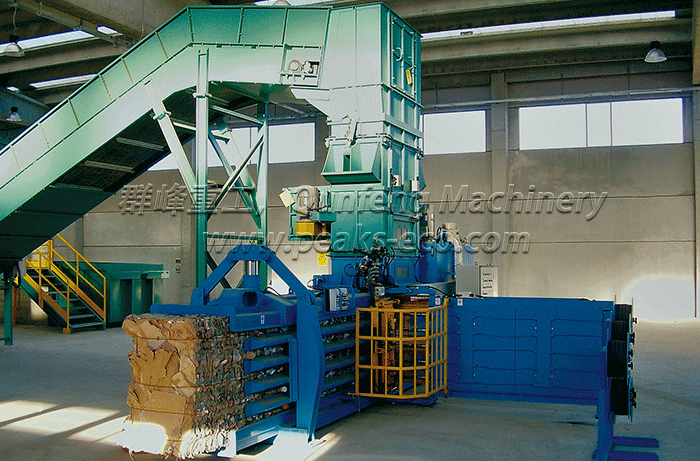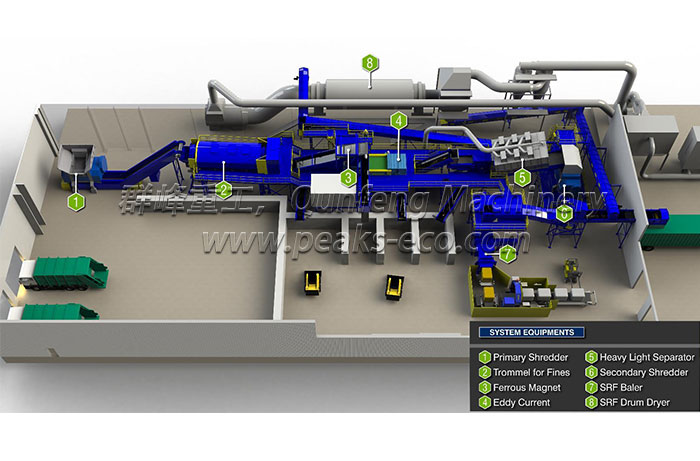Garbage sorting machine manufacture said garbage classification refers to a series of activities that classify, store, put and carry garbage according to certain regulations or standards, so as to turn it into public resources. The purpose of classification is to improve the resource value and economic value of garbage, and strive to make the best of it. Garbage belongs to the public private goods in the stage of classified storage. After being classified and put into use by the public, garbage will become a regional quasi public resource in the community or community where the public lives. After being transported to the garbage concentration point or transfer station, garbage will become a public resource without exclusion. From the perspective of domestic and foreign cities' classification methods of domestic waste, they are generally classified according to the composition and production of waste, combined with the resource utilization and treatment of local waste.
Garbage types :
Recyclable : recycling sorting equipment factory introduce that recyclable materials mainly include waste paper, plastic, glass, metal and cloth.
Waste paper: mainly including newspapers, periodicals, books, all kinds of wrapping paper, etc. However, it should be noted that paper towels and toilet paper are too water-soluble to be recycled.
Plastics: all kinds of plastic bags, plastic foam, plastic packaging, disposable plastic tableware, tableware, hard plastic, plastic toothbrush, plastic cups, mineral water bottles, etc.
Glass: mainly including all kinds of glass bottles, broken glass pieces, mirrors, thermos bottles, etc.
Metal: mainly including cans, cans, etc.
Cloth: mainly including waste clothes, tablecloth, washcloth, schoolbag, shoes, etc.
Through comprehensive treatment and recycling, these wastes can reduce pollution and save resources. For example, each ton of waste paper recovered can make 850kg of paper, save 300kg of wood, and reduce 74% of pollution compared with equivalent production; each ton of plastic beverage bottle recovered can obtain 0.7T of secondary raw materials; each ton of waste steel recovered can make 0.9t of steel, saving 47% of cost compared with ore smelting, reducing 75% of air pollution and 97% of water pollution and solid waste.

Other wastes (called dry garbage in Shanghai) include bricks, tiles, ceramics, waste soil, toilet waste paper, paper towels and other wastes that are difficult to be recycled, as well as fruit shells, dust and food bags (boxes). Sanitary landfill can effectively reduce the pollution of groundwater, surface water, soil and air.
The big stick bone is listed as "other garbage" because it is "hard to corrode".
Corn kernel, nut shell, kernel and chicken bone are kitchen waste.
Toilet paper: toilet paper and toilet paper are soluble in water. They are not recyclable "paper". Similar ones include cigarette boxes, etc. Food waste bagging: common plastic bags, even degradable ones, are far more difficult to corrode than food waste. In addition, the plastic bag itself is recyclable waste. The correct way is to put the kitchen waste into the garbage can, and the plastic bag into the "recyclable garbage" can. Shell: in the garbage classification, the mark of "shell and melon skin" is peanut shell, which really belongs to kitchen waste. The leftover cooking oil in the house is also classified as "kitchen waste". Dust: in the garbage classification, the dust belongs to "other garbage", but the residual branches and leaves belong to "kitchen garbage", including the broken flowers in the home, etc.
Kitchen waste (wet waste) :Kitchen waste (called wet waste in Shanghai) includes food waste such as leftovers, bones, vegetable roots, leaves and peel. The compost can produce 0.6 ~ 0.7 tons of organic fertilizer per ton through the biological technology in situ treatment.
Harmful Waste : Hazardous waste contains heavy metals, toxic substances that are harmful to human health or wastes that cause real or potential harm to the environment. Including batteries, fluorescent tubes, light bulbs, mercury thermometers, paint barrels, some home appliances, expired drugs, expired cosmetics, etc. These wastes are generally recycled or landfilled separately.